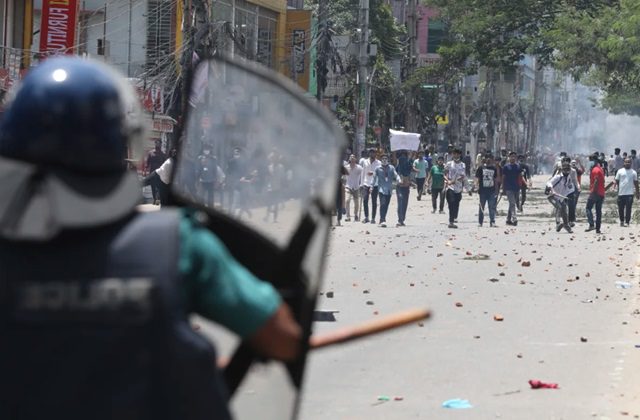BTN News: Bangladesh experienced a complete shutdown of internet and mobile phone services on Friday after days of violent protests over the distribution of public jobs. Local media reported that at least 28 people have died this week due to the unrest.
The protests, which have been escalating since Monday, are the largest seen in the country since Prime Minister Sheikh Hasina was re-elected for a fourth consecutive term in January. The election, boycotted by major opposition parties, has led to widespread dissatisfaction.
The internet blackout followed a surge in violence on Thursday. Students attempted to enforce a “total blockade” across the nation, which intensified the clashes. Reports of deaths have been rising, and demonstrators attacked the headquarters of the state television broadcaster. Witnesses told The Associated Press that protestors entered the main entrance, set cars and the reception area on fire, and caused significant damage. A producer recounted his escape by jumping over a wall, while his colleagues were trapped inside the building.
Despite the chaos, the broadcaster continued to air, although some residents in the capital, Dhaka, reported not receiving its signal. According to local TV, at least 22 people died on Thursday alone, in addition to six fatalities earlier in the week. Official confirmation of the death toll was not immediately available.
By Friday morning, internet and mobile phone services were down in Dhaka. Social media platforms like Facebook and WhatsApp were also inaccessible. Protestors vowed to continue their blockade on Friday and called for mosques across the country to hold funeral prayers for the deceased.
The unrest centers around demands to abolish a quota system that reserves up to 30% of government jobs for descendants of veterans who fought in the 1971 independence war. Protestors argue this system is discriminatory and primarily benefits supporters of Hasina’s Awami League party, which led the independence movement. They are calling for a merit-based system instead.
The ruling party has accused the opposition of inciting the violence. Authorities have raided the offices of the main opposition party, the Bangladesh Nationalist Party (BNP), and arrested members of its student wing. The BNP plans to hold nationwide demonstrations in support of the student activists and against the quota system.
In 2018, following massive student protests, the Hasina government temporarily suspended the quota system. However, last month, the High Court of Bangladesh reinstated the quotas in response to petitions from war veterans’ families, sparking the current wave of protests. The Supreme Court has since put this order on hold pending an appeal, with a hearing scheduled for Sunday.
The situation remains tense as the country awaits further developments and potential government responses to the protestors’ demands. The widespread disruption of communication services has added to the uncertainty and challenges faced by the citizens of Bangladesh.
Bangladesh in Turmoil Over Job Quota Protests
Internet and mobile services across Bangladesh were shut down on Friday following days of intense protests over a controversial public job quota system. The violence has claimed at least 28 lives this week, according to local media reports.
The protests, which began weeks ago, escalated significantly on Monday, marking the largest unrest since Prime Minister Sheikh Hasina’s re-election in January. The election, which saw her win a fourth consecutive term, was boycotted by key opposition parties, fueling further discontent.
Thursday witnessed a peak in violence as students attempted to enforce a “total blockade” across the nation. This led to multiple clashes and an attack on the state television broadcaster’s headquarters. Protestors set fire to vehicles and the reception area, causing significant damage. A producer described his harrowing escape, while others were trapped inside. Despite the turmoil, the broadcaster continued to operate, though some viewers in Dhaka reported signal disruptions.
Local television reports indicated that 22 people died on Thursday alone, adding to six deaths earlier in the week. Official figures were not immediately available for confirmation.
By Friday morning, internet and mobile services in Dhaka were non-functional, with social media platforms like Facebook and WhatsApp also down. Protestors announced plans to extend their blockade and urged mosques to hold funeral prayers for those who died.
The protests are driven by demands to abolish a quota system that reserves up to 30% of government jobs for families of veterans from the 1971 independence war. Critics argue the system is unfairly advantageous to supporters of Hasina’s Awami League and should be replaced with a merit-based system.
The ruling party has blamed the opposition for inciting violence. Authorities have searched BNP offices and detained members of its student wing. The BNP plans to hold nationwide protests in support of the activists and against the quota system.
In response to massive student protests in 2018, the Hasina government had suspended the quota system. However, the High Court reinstated it last month following petitions from veterans’ families, triggering the current protests. The Supreme Court has since suspended this reinstatement pending an appeal, with a hearing scheduled for Sunday.
As the situation develops, Bangladesh remains on edge, with citizens facing significant communication challenges due to the service shutdowns. The outcome of the Supreme Court hearing and the government’s next steps will be crucial in determining the resolution of this crisis.


